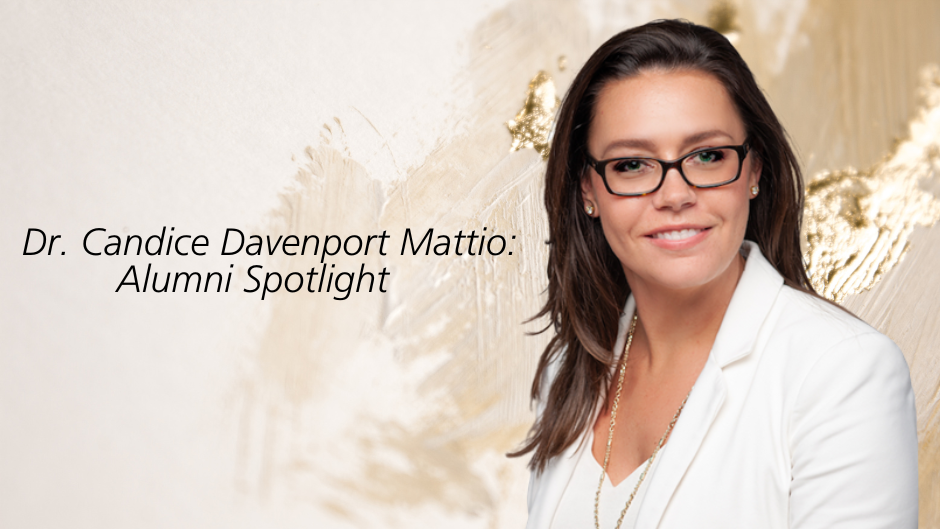Dr. Candice Davenport Mattio will never forget her experience building a music program from scratch for underserved students in westside Chicago.
Told the school had no budget for instruments, Mattio fundraised and persevered, inspiring many of her students to study music in college. But while talking with these students, Mattio often wondered if she was doing a disservice to them. Would colleges even entertain someone without a classically trained background? Mattio pondered how she could help shift the mindset of college music programs for students like hers. It also sparked her research into alternative teaching and learning methods within music education at the University of Miami.
Originally from the Gulf Coast near New Orleans, Mattio had a wealth of experience with teaching in secondary public school band programs and drumlines before heading to Chicago, where she earned her master’s degree from Northwestern University. During that time, she spent her days working at a brand-new school in an underserved neighborhood in Chicago’s Westside. The school needed a teacher to shape their music program, but had limited resources for instruments. However their school model, with a one-to-one laptop to student ratio, allowed her to build the first blended model music program of its kind. Which began her journey of implementing technology and creativity as a method to teach music education.
During her time at the University, Mattio was a Teaching Assistant where she taught undergraduate music education students and mentored performance majors in the music reach program. She also facilitated learning opportunities for students to gain more experience and techniques for future teaching roles. In addition to those responsibilities, Mattio worked side-by-side with student teachers, and her mentors, music education professors Dr. Carlos Abril, Dr. Don Coffman, who chairs the Department of Music Education and Music Therapy, and her dissertation advisor, Dr. Steve Zdzinski.
“I had really excellent mentorship from the faculty and developed an expertise in both quantitative and qualitative methodology for research,” Mattio said. The encouragement she received to get involved in other programs, outside of the Frost School, helped Mattio carve her own path and formed invaluable connections and mentorships. With the help of her mentors, Mattio said she formed a unique niche in the music education research field that lacked experts. She earned the National Dissertation Award for her research and completed her Ph.D. program in three years.
After graduation, Mattio worked at Florida International University as an Assistant Professor and the Coordinator of Music Education, where she helped to elevate the reputation of FIU’s research music programs by creating innovative curricula for the undergraduate and online master’s degrees. Mattio highlighted that her experience at FIU helped form the unique intersectionality of her work that showcased the psychological effects of creativity and music, and how integrating technology as an educational tool can effectively help younger students to access and create music.
At USC, Mattio will be teaching subjects that she is passionate about: research methodologies, technology and computer music, and new initiatives in popular music education. Without the interdisciplinary experiences of taking courses outside of the Frost School, she would not have the opportunity to sit amongst prolific innovators in her field. She is honored to have the opportunity to present groundbreaking research, like her current research project that is highlighting the lack of representation of women in popular, electronic music spaces. Providing a space for researching modern music and becoming an expert in alternative, technological teaching methods to future educators, is where sees the future of music education programs is headed.
With this new opportunity, Mattio was pleased to express that her mentor she acquired at Northwestern University, contributed to her interest in creativity and technology earlier in her career. She chuckled with gratitude as she expressed that “it all has come full circle with USC because it’s my mentor, Peter Webster, that is retiring, and I am stepping into a role that he always envisioned.”
Mattio advises graduate students to come into their respective programs with established “wonderments,” a term she credits to Dr. Carlos Abril, or topics that personally interested students the most. Students should use their curiosity and their own ideas to guide their research and job opportunities post-graduation, and students should also make strong connections with their professors and seek out mentorship. Mattio added that “mentorships that are formed can last a lifetime, and when people are willing to write for you, or to speak for you and things like that, says a lot about your character. And that's stuff that you can't put on a CV.”

